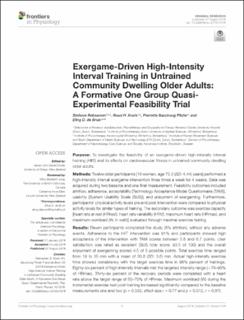Please use this identifier to cite or link to this item:
https://doi.org/10.21256/zhaw-26151| Publication type: | Article in scientific journal |
| Type of review: | Peer review (publication) |
| Title: | Exergame-driven high-intensity interval training in untrained community dwelling older adults : a formative one group quasi-experimental feasibility trial |
| Authors: | Rebsamen, Stefanie Knols, Ruud H. Pfister, Pierrette Baschung de Bruin, Eling D. |
| et. al: | No |
| DOI: | 10.3389/fphys.2019.01019 10.21256/zhaw-26151 |
| Published in: | Frontiers in Physiology |
| Volume(Issue): | 10 |
| Issue: | 1019 |
| Issue Date: | 2019 |
| Publisher / Ed. Institution: | Frontiers Research Foundation |
| ISSN: | 1664-042X |
| Language: | English |
| Subjects: | Aerobic exercise; Exergaming; Feasibility; High-intensity interval training; Older adult; Virtual reality |
| Subject (DDC): | 613: Personal health |
| Abstract: | Purpose: To investigate the feasibility of an exergame-driven high-intensity interval training (HIIT) and its effects on cardiovascular fitness in untrained community dwelling older adults. Methods: Twelve older participants [10 women, age 72.3 (SD: 4.44) years] performed a high-intensity interval exergame intervention three times a week for 4 weeks. Data was acquired during two baseline and one final measurement. Feasibility outcomes included attrition, adherence, acceptability [Technology Acceptance Model Questionnaire (TAM)], usability [System Usability Scale (SUS)], and enjoyment of exergaming. Furthermore, participants’ physical activity levels pre and post intervention were compared to physical activity levels for similar types of training. The secondary outcome was exercise capacity [heart rate at rest (HRrest), heart rate variability (HRV), maximum heart rate (HRmax), and maximum workload (W, in watt)] evaluated through maximal exercise testing. Results: Eleven participants completed the study (8% attrition), without any adverse events. Adherence to the HIIT intervention was 91% and participants showed high acceptance of the intervention with TAM scores between 5.8 and 6.7 points. User satisfaction was rated as excellent (SUS total score: 93.5 of 100) and the overall enjoyment of exergaming scored 4.5 of 5 possible points. Total exercise time ranged from 19 to 35 min with a mean of 30.8 (SD: 3.6) min. Actual high-intensity exercise time showed consistency with the target exercise time in 98% percent of trainings. Eighty-six percent of high-intensity intervals met the targeted intensity range (>70–90% of HRmax). Thirty-six percent of the recovery periods were completed with a heart rate above the target range of 50–70% of HRmax. Maximum workload (W) during the incremental exercise test post-training increased significantly compared to the baseline measurements one and two (p = 0.032, effect size r = 0.77 and p = 0.012, r = 0.87). Conclusion: High-intensity interval training through exergaming is feasible, safe, and shows high usability and acceptance in community dwelling older people. Exergame-driven HIIT had a significant effect on maximum power output on an incremental exercise test. A more extensive exergame intervention period, higher work to recovery ratios as well as a higher-intensity activity should be considered in future projects. |
| URI: | https://digitalcollection.zhaw.ch/handle/11475/26151 |
| Fulltext version: | Published version |
| License (according to publishing contract): | CC BY 4.0: Attribution 4.0 International |
| Departement: | School of Health Sciences |
| Organisational Unit: | Institute of Physiotherapy (IPT) |
| Appears in collections: | Publikationen Gesundheit |
Files in This Item:
| File | Description | Size | Format | |
|---|---|---|---|---|
| 2019_Rebsamen-etal_Exergame-driven-high-intensity-interval-training-untrained-older-adults.pdf | 1.19 MB | Adobe PDF |  View/Open |
Show full item record
Rebsamen, S., Knols, R. H., Pfister, P. B., & de Bruin, E. D. (2019). Exergame-driven high-intensity interval training in untrained community dwelling older adults : a formative one group quasi-experimental feasibility trial. Frontiers in Physiology, 10(1019). https://doi.org/10.3389/fphys.2019.01019
Rebsamen, S. et al. (2019) ‘Exergame-driven high-intensity interval training in untrained community dwelling older adults : a formative one group quasi-experimental feasibility trial’, Frontiers in Physiology, 10(1019). Available at: https://doi.org/10.3389/fphys.2019.01019.
S. Rebsamen, R. H. Knols, P. B. Pfister, and E. D. de Bruin, “Exergame-driven high-intensity interval training in untrained community dwelling older adults : a formative one group quasi-experimental feasibility trial,” Frontiers in Physiology, vol. 10, no. 1019, 2019, doi: 10.3389/fphys.2019.01019.
REBSAMEN, Stefanie, Ruud H. KNOLS, Pierrette Baschung PFISTER und Eling D. DE BRUIN, 2019. Exergame-driven high-intensity interval training in untrained community dwelling older adults : a formative one group quasi-experimental feasibility trial. Frontiers in Physiology. 2019. Bd. 10, Nr. 1019. DOI 10.3389/fphys.2019.01019
Rebsamen, Stefanie, Ruud H. Knols, Pierrette Baschung Pfister, and Eling D. de Bruin. 2019. “Exergame-Driven High-Intensity Interval Training in Untrained Community Dwelling Older Adults : A Formative One Group Quasi-Experimental Feasibility Trial.” Frontiers in Physiology 10 (1019). https://doi.org/10.3389/fphys.2019.01019.
Rebsamen, Stefanie, et al. “Exergame-Driven High-Intensity Interval Training in Untrained Community Dwelling Older Adults : A Formative One Group Quasi-Experimental Feasibility Trial.” Frontiers in Physiology, vol. 10, no. 1019, 2019, https://doi.org/10.3389/fphys.2019.01019.
Items in DSpace are protected by copyright, with all rights reserved, unless otherwise indicated.